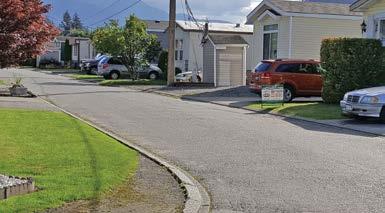
5 minute read
Considering a Manufactured Home?
In today’s market, the option to purchase a manufactured home may appear an attractive opportunity for those getting into the market or looking to downsize.
It is much more affordable in the current market to purchase a manufactured home. On average in the Fraser Valley, it costs $75,000 for a single-wide and $150,000 for a double-wide home.
There are many factors to consider.
In most cases with the purchase of a manufactured home, the buyer owns the home, not the land. The majority of manufactured homes are located in privately owned manufactured-home parks, operated by a manager who usually lives on site.
The contract for purchase and sale of a manufactured home is subject to the park manager’s approval. Typically, the park manager would set up an interview with the potential purchaser to go over the park rules and sign a tenancy agreement. Park managers generally prefer that owners occupy the homes.
Each manufactured-home park is unique with no unified pad-fee structure. “Pad rental fees” are payable monthly to the park manager or management company, essentially for renting the land space. The average cost to rent a manufactured home pad in the Chilliwack area is $500 to $600 per month. That cost is not comparable to strata fees; strata fees average $200 to $350 per month, including operating costs and maintenance.
With a manufactured home purchase, the buyer is paying to have a space in the park. The buyer is usually responsible for the upkeep of the home and yard.
In some cases, manufactured homes are located on leased land where the manufactured home is purchased and the lot is leased. There are very few on freehold land that the buyer also owns. If the owner owns the land, the manufactured home is usually deregistered, an exemption is filed with the Manufactured Home Registry, and the home is then considered part of the property. In the Chilliwack area, there are 21 manufactured-home parks with pad rentals, 2 on leased land and 1 bare-land strata.
A manufactured home is considered personal property, not real property, therefore the conveyance process is different. First, a manufactured-home search is conducted instead of a title search. In BC, manufactured homes are registered through the Manufactured Home Registry in Victoria; the bill of sale must be witnessed or notarized and submitted in person, by mail, or through BC Online with an identification form—unlike the transfer of real property that is done online through the Land Title Office.
Property transfer tax is not applicable on the purchase of a manufactured home because it is not the purchase of land. If an individual has owned a manufactured home as a principle residence, he or she can still claim the first-time homeowners grant on a future purchase (unless the manufactured-home owner also owned the land where the home is placed).
If a change is required on transfer documents of a manufactured home, such as when an owner passes away or there is a name change, certified true copies of the death certificate or marriage certificate are sufficient—unlike the Land Title Office that requires the originals. If an owner wants to move the manufactured home, he or she will require a transport permit because the registered location must match the physical location of the home.
To transfer a manufactured home, it must have a Canadian Standards Association (CSA) certification
label. There is usually a clause in the contract of purchase and sale stating the seller is responsible to provide a valid CSA label that shows the CSA number for the home. If the label has worn off, been removed, or is lost, that can create a delay in a transaction. If a label cannot be found, the BC Safety Authority will allow a licensed electrical contractor to do an inspection and confirm the home meets the safety standards.
It can be difficult to obtain financing for the purchase of a manufactured home, especially if it is on a pad. Potential lenders will look at the economic life of the manufactured home; they depreciate much faster than real property.
To determine the economic life, a lender will look at improvements that have been made to the manufactured home such as roof, deck, and exterior siding. Improvements will extend the economic life. If a lender determines there are 20 years of economic life left, the lender may consider funding the purchase. The amortization period, however, will be the economic life minus 5 years. For example, with 20 years of economic life left, the lender will fund a 15-year mortgage.
If a manufactured home is over 25 years old, the home will be highly scrutinized; the lender will want to see pictures, an appraisal, and a list of depreciating assets in the manufactured home. The lender will also want confirmation that the home is on a concrete foundation or welded down and cannot be easily moved, to provide some assurance that the lender’s interest is secure.
If the purchaser is approved for a mortgage, the rate will be the posted rate and will not be discounted unless the potential owner is CMHC insured. That requires the client to prepay up to 4 percent of the mortgage amount.
As with most big purchases in life, it is important that clients have all the relevant information to make an informed decision. BC Notaries can share the positives and negatives and the process of how manufactured homes are conveyed with clients considering the purchase or sale of a manufactured home. s
Local REALTOR® Ron Plowright (L) and mortgage planner Steve Brouwer with whom I spoke about mobile homes Kim McLandress is a BC Notary practising with Simpson Notaries in Chilliwack.
WHAT’S THE REAL VALUE OF YOUR PROPERTY?
AIC-designated appraisers can tell you.
Serving all of British Columbia AICanada.ca/British-Columbia






